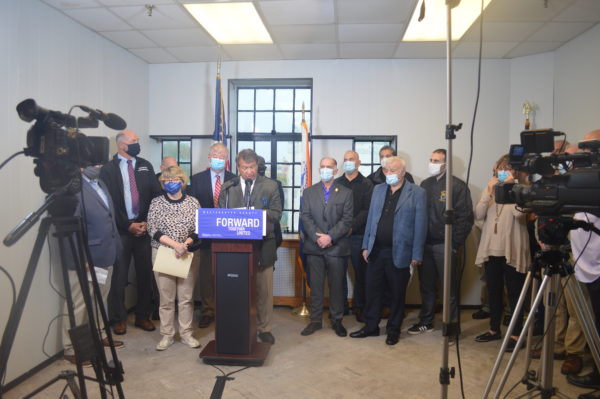While heavy rain and high wind put a damper on construction activity outside, Westchester County Executive George Latimer and representatives from the construction industry gathered inside of the administration building at Playland Park in Rye on Oct. 26 to underscore the importance of major capital projects that maintain and reconstruct the county”™s physical assets.

Among those on hand were: Eddie Doyle, president of the Building and Construction Trades Council of Westchester and Putnam Counties; John Cooney Jr., executive director of the Construction Industry Council of Westchester and the Hudson Valley; Louis A. Picani, president and principal officer of Teamsters Local 456; and Richard McSpedon, vice president of the Westchester-Putnam Central Labor Body.
Latimer said that funding for infrastructure and facilities construction projects included in the newly proposed $476.4 million Capital Budget for 2022 is an investment in the county”™s future. Among the projects are: infrastructure rehabilitation at Playland (including reconstruction of the swimming pool and bathhouse and new work on the Ice Casino and entry plaza); reconstruction of Memorial Field in Mount Vernon; rebuilding the Glen Island Bridge in New Rochelle; and $28 million in improvements at the Westchester County Airport.
“We”™re focused on maintaining our assets and utilizing capital funds to see those projects through,” Latimer said. “It”™s really no different than putting money into your own house. It is the greatest asset that most of us own. We know that if it deteriorates when it comes time to fix it, it will be more expensive if we delay that process. But, we also know that if at some point in time we sell that house, it has greater value if we”™ve invested in it as we go along.”
When asked by the Business Journal about the federal infrastructure legislation now being debated in Washington, Latimer said that there is a list of county projects that could get underway if federal funding materializes.
“We don”™t know the final look of the infrastructure discussions that are happening in Washington,” Latimer said. ”We know that the Senate passed a hard infrastructure, physical infrastructure, they are now departing a soft infrastructure bill, social infrastructure bill. We don”™t know what the outcome of that is. If these two bills pass and they provide federal resources for us to use, Joan (McDonald, the county”™s director of operations) has got a long list of the projects that didn”™t make it into the Capital Budget. If you look at the Capital Budget there are year two, three, four and five projects that we could accelerate. We have projects, infrastructure projects, that are necessary, that while not owned by the county, could be advanced by that bill.”
Cooney said that the county moving ahead with capital projects means not only putting people to work in the construction industry, but also improving the quality of life for the county”™s residents.
He said that an important accomplishment under the Latimer administration was removing a requirement that any plan to issue bonds to pay for a project costing over $10 million needed a vote of approval from the public. Cooney pointed out that this often resulted in large projects having to be broken up into smaller ones in order to honor the $10 million bonding cap.
“The Capital Budget supports high-quality jobs, improves the quality of life for all residents and is a solid investment for the future of Westchester County,” Cooney said.
McSpedon said, “Many union members will be on these projects and many live right here in the county. Those jobs are all prevailing-wage jobs and that helps strengthen the standard of living in our community.”
Latimer said that the county has been conducting a constructive dialogue with management and labor in construction as it moves forward with various capital projects. It is also extending that dialogue to the private sector, as the county”™s Industrial Development Agency actively welcomes developers and provides financial incentives for a variety of construction projects.
“We see it as a ”˜win-win,”™ not as an ”˜I win, you lose,”™” Latimer said. “I think we”™ve had productive dialogue and some of the dialogue I”™m not a part of is between labor and the development community and I”™m always hopeful. When I walk in a restaurant and I see a member of labor and a member of the development community having breakfast I see it as a positive sign. There”™s dialogue going on. I don”™t know who picked up the check, but the bottom line is that we think that”™s where we are going to go in the future in Westchester County.
“We have always been a county that has moved forward quickly. Whether we”™re ahead of other counties all the time is always subjective but I think this county ”” long before I became county executive ”” showed an ability to accomplish things, and that”™s where our mindset is.”

















